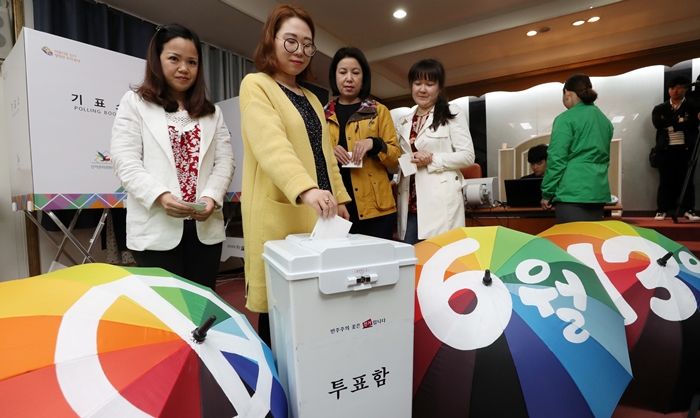
Non-citizen residents in Korea practice voting at the Namgu Multicultural Family Support Center in Busan on April 16. (Yonhap News)
By Kang Gahui and Kim Young Shin
The seventh nationwide local elections take place on June 13, and this year non-citizen residents can also participate.
As written in Article 15 of the Public Official Election Act, non-citizen residents have the right to vote if three years have passed since they acquired permanent residence in Korea. The right to vote was awarded to non-citizens starting in the fourth local elections in 2006, which was after revision of the act in 2005.
Korea is the only Asian country that grants non-citizens the right to vote in local elections.
This year, the population of non-citizen permanent residents with the right to vote has reached 106,205, double the number four years ago. However, voter turnout in that segment of the population has remained low.
Here are some questions and answers for non-citizen voters who would like to participate in the upcoming local elections next week.
- Who can register to vote?
Any non-citizen resident who acquired permanent residency three or more years prior to election day, according to the Immigration Act, and who is registered to vote with their local government. Such non-citizen residents cannot vote for the president or for members of the National Assembly.
- Where can voters check their voter registration number and polling station?
Polling stations will be set up in town halls in every community across Korea. Voters can check their voter registration number and their local polling station in the voting guidebook sent to each household, in Korean, English and simplified Chinese. The Republic of Korea National Election Commission will also publish an announcement on its website (www.ned.go.kr) in English, simplified Chinese, Japanese and Vietnamese.
- What do voters have to bring with them?
Non-citizen voters must carry their national ID card and visit their assigned polling station on June 13 between 6 a.m. and 6 p.m.
- What's the voting process for local elections?
In local elections, a voter has the right to vote for seven positions.
First, the non-citizen voter presents their national ID card and physically signs the voting roll. They are presented with three ballot papers for mayor or governor, head of the local government and for the educational superintendent in the area. With the stamp that's provided inside the private voting booth, voters select one candidate for each position. Then the voters fold the ballot paper to ensure their vote is secret and they place all three papers into the ballot box.
They are then given four more ballot papers: one for the constituency member and another for the proportional representation member in the metropolitan city or the provincial council, and then one for their constituency member and a final one for the proportional representation member in the local government. Likewise, voters only select one candidate for each position and place all four ballots into a ballot box.
Residents of Sejong City and Jeju-do Province only vote for four and five candidates, respectively.
- What if a voter can’t visit the polling station on June 13?
Early voting is available on June 8 and 9 at local town halls between 6 a.m. to 6 p.m.
kgh89@korea.kr